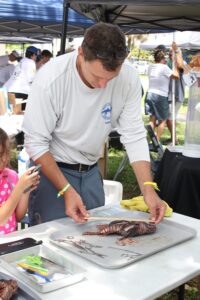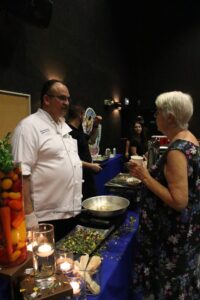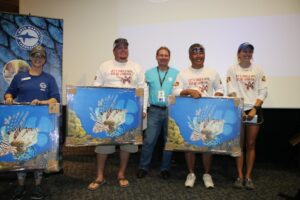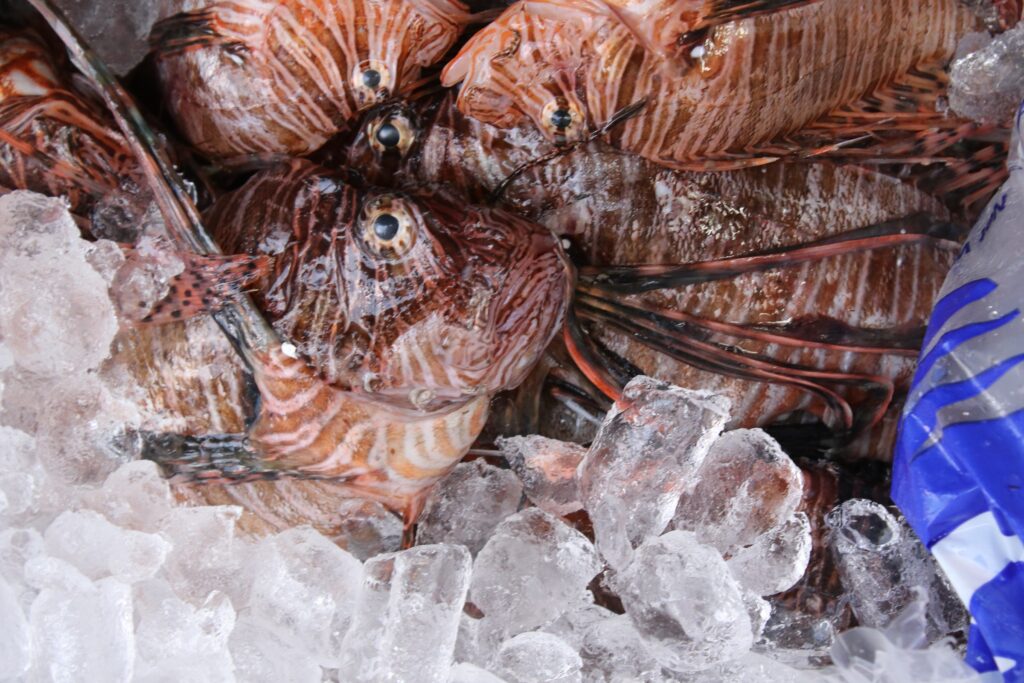By Stephanie Hagan
On July 7 and 8, divers boarded their boats, plunged into the Gulf of Mexico and removed 545 invasive lionfish during the fifth annual Sarasota Lionfish Derby, which concluded today, July 8, at Mote Marine Laboratory.
The Sarasota derby, part of REEF’s 2018 Lionfish Derby Series Presented by Whole Foods Market, was organized by Mote, a world class marine science institution, and Reef Environmental Education Foundation (REEF), which helps study and address the lionfish invasion. Non-native lionfish have invaded Atlantic waters from South America to North Carolina, including the Caribbean and Gulf of Mexico, and lionfish derbies are part of an effort to reduce their populations while monitoring and studying the invasion. Four upcoming derbies in the REEF series are accepting registration at: reef.org/lionfish/derbies
The Sarasota derby, which officially launched July 6 with a captains’ meeting, drew six teams that contended to catch the most lionfish, the largest lionfish and the smallest lionfish in Gulf of Mexico waters ranging from Collier to Escambia County.
On July 8, cash prizes ranging from $150 to $1,000 were awarded to teams who won or placed in each category during an awards ceremony in Mote’s WAVE Center.
Mote’s Membership & Special Events Coordinator Sam Byrd thanked attendees and participants: “We’ve been looking for new opportunities to address this serious invasion in the southwest Florida region, to complement the wonderful work of REEF and others who have done so much for lionfish monitoring, research and education. Each lionfish derby increases our enthusiasm for this worthy cause, and we thank everyone who came out and participated.”
During the derby, top local chefs from Indigenous Restaurant, Michael’s on East, Mattison’s Forty-One, Modern Events/Tableseide Restaurant Group and the Deep Sea Diner, located inside Mote Aquarium, prepared unique and tasty dishes for a lionfish cooking competition. Lionfish derby teams and members of the public tasted the dishes and voted to elect the top three:
- First Place: Chef Jamil Pineda of Michael’s on East, serving pan-roasted lionfish with date and roasted pine nut chutney, with curried shrimp bisque, beech mushrooms and garlic Swiss chard
- Second place: Chef John Mancini, Deep Sea Diner, serving lionfish cake with chipotle aioli on a bed of spaghetti cucumber
- Third place: Chef Steve Phelps, Indigenous, serving Everglades baked lionfish with tarragon Parmesan breadcrumbs
The public also enjoyed a raffle and watched lionfish be counted and measured by REEF staff and dissected by Mote scientists. Collecting data on local lionfish populations year after year helps scientists study population dynamics, behavior and adaptations over time.
Surrounded by curious visitors, Mote Staff Scientist Dr. Jim Locascio leaned over a tray containing a large lionfish and dissected the predator to examine its stomach contents. “This is a nice-sized lionfish, and I see at least four small fish in its stomach. Lionfish are voracious predators and they have the ability to destabilize populations of native species. We can sample their stomach contents and use DNA analyses to understand the diversity of prey and see what species are being affected — in particular, which native sport or food fishes are hit the hardest.”
The public can help document the lionfish invasion by reporting sightings through REEF, U.S. Geological Survey or the Florida Fish and Wildlife Conservation Commission (FWC). FWC has a Report Florida Lionfish app available for smartphones, and their Lionfish Challenge rewards those who harvest the species. REEF also has a free Lionfish Sightings App for iPhone, which allows people to track and record lionfish sightings all around the invaded region.
Lad Akins, Director of Special Projects at REEF, said: “While the lionfish invasion may seem insurmountable, we are finding that derbies like these and ongoing removals by the dive community are having a significant effect on reducing lionfish populations and allowing native marine life to recover. Even non-divers can help by asking for lionfish at their favorite restaurants and supporting invasive species regulations.”
Most lionfish:
First (award: $1,000 and original lionfish prints created by local artist Carlos Cardenas):
Team: Humpty Dumpty. Team members are: Koa Viravong, Josh Taylor, Tony Troung
Number of lionfish caught: 244
Second ($500):
Team: ZooKeeper/Proweb
Number of lionfish caught: 153
Third ($250):
Team: Got Fish
Number of lionfish caught: 88
Fourth ($200)
Team: ZooKeeper
Number of lionfish caught: 46
Fifth ($150)
Team: Barbarella
Number of fish caught: 14
Sixth ($150)
Team: Local for Good
Number of lionfish caught: 0
Largest lionfish:
First ($500):
Team: Humpty Dumpty
Lionfish size: 391 millimeters
Second ($250):
Team: Barbarella
Lionfish size: 382 millimeters
Third ($150):
Team: ZooKeeper/Proweb
Lionfish size: 380 millimeters
Smallest lionfish:
First ($500):
Team: Got Fish
Lionfish size: 98 millimeters
Second ($250):
Team: ZooKeeper/Proweb
Lionfish size: 142 millimeters
Third ($150):
Team: ZooKeeper
Lionfish size: 153 millimeters
Mote thanks the Sarasota Outboard Club for the donation of their facilities for outdoor activities in this year’s Lionfish Derby.
Sponsors of the REEF 2018 Summer Lionfish Derby Series include: Whole Foods Market; Florida Park Service; National Marine Sanctuaries – Florida Keys; Ocean Reef Conservation Association; Florida Fish and Wildlife Conservation Commission; Zookeeper; Mote Marine Laboratory; Loggerhead Marinelife Center; 15th Street Fisheries; Phillip and Patricia Frost Museum of Science; Atlantis Dive Resort and Beach Marine





